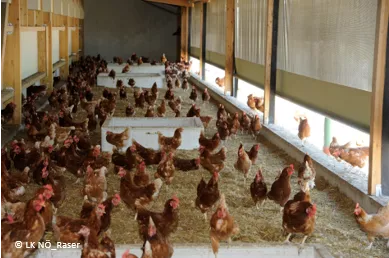General information
RDP Priority
- P2. Competitiveness
RDP Focus Area
- 2A: Farm’s performance, restructuring & modernisation
RDP Measure
- M04: Investments in physical assets
Summary
The Oberger family in Austria decided to convert their dairy farm to produce organic eggs amid low milk prices and growing demand for organic products. They also wanted a less physical and labour-intensive production method as well as to farm using organic methods. The family converted the farm to organic in 2014.
The family built a modern barn according to organic guidelines to house 6 000 organic laying hens in 2015. They also created a covered outdoor area and measures for the hens’ welfare such as dust baths. Conveyor belts transport the collected eggs, which are then marketed by the company ‘Schlögl Ei’.
Results
An organic barn was constructed to house 6 000 laying hens including an outdoor area and measures for their welfare.
The family supplies 5 500 organic eggs per day to the company ‘Schlögl Ei’, which markets them.
The family expects the barn to pay itself off after 20 years, after an 830 000 euro investment (of which around 740 000 euros are gross costs for the project including 120 000 from EU and national level).

Promoter
Michael Oberger, Schwarzenbach, Niederösterreich
Funding
Total budget 650 000 (EUR)
RDP support 120 000 (EUR)
Ressources
Documents
contact

